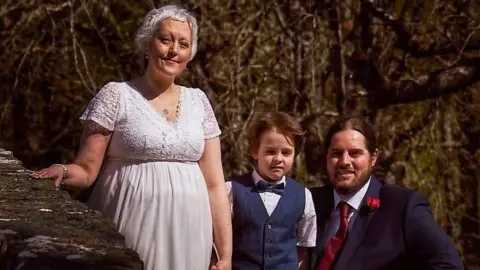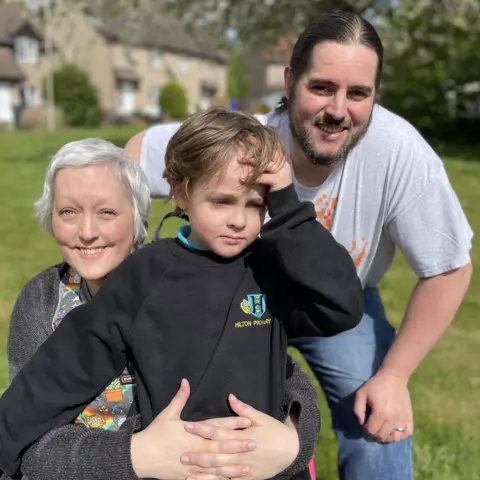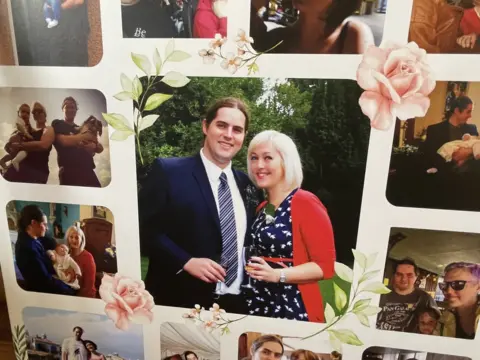Cost of living: Struggling for heating while saving for my funeral
When saving up after her engagement, Melanie Finlay says she often joked about what the money would pay for first - her wedding, or her funeral.
The 48-year-old has been given between 12-18 months to live as metastatic cancer has spread to her bones, lungs, hips, knees and bone marrow.
If her current course of treatment does not work, she will be placed on palliative care - doctors say it may be her last Christmas with husband Tom and their seven-year-old son Joseph.
But Melanie says she is not afraid to die.

What worries her is the financial burden her family will face after she is gone amid a cost-of-living crisis.
"I'm worried that Tom is not going to be financially secure with Joseph because he's going to lose a lot of money when I go," she said.
"There was some money left over from the wedding and I'm now using it as my funeral fund. Because I don't want my family to be burdened with the heavy cost of a funeral so soon.
"If things continue to escalate cost-wise he's really going to struggle."
Melanie, who struggles to walk, receives reduced pay from her employer due to her illness and after a six-month wait, is claiming a disability benefit - Personal Independence Payment (PIP).
Terminally-ill people in England and Wales can get higher or fast-tracked benefits payments - but these rules only apply to some benefits if a person has six months or less to live.
There are no time restrictions in Scotland's rules for social security benefits for terminally-ill people, unless the benefits are reserved.
Meanwhile, Melanie's husband Tom is on reduced hours and works from home in order to be his wife's full-time carer.

The family live in a two-bedroom flat in Inverness with a pre-paid energy meter - and currently spend at least £300 per month on gas and electricity.
And amid an overall increased cost of living, the couple have found their petrol costs have also risen due to Melanie's frequent hospital appointments.
"We're not destitute," she said. "We've still got a roof over our head and food on the table but we're having to watch our cash now.
"Having bone cancer as much as I do, I feel the cold - so we need to have a warm house. We were literally putting £100 on the electricity and it was lasting us maybe 10 days."
'I can't afford a bucket list'
Backpay from Melanie's PIP helped pay for her £3,000 wedding last month, with some left over which she has saved for her funeral.
Her focus now is making memories before she becomes too unwell to travel.
"I'd really like to go and do things before I die like a bucket list but I can't afford it," she said. "Even if I went on a small holiday to Europe with the family I can't afford the medical insurance because we're not part of the EU. I have to pay extortionate amounts for medical insurance because I'm stage four cancer patient.
"We're having to look at doing wee trips around the country because I'm trying to make memories with my son before I die - to do things together as a family so he has something to remember me by."

A study released on Thursday by end of life charity Marie Curie and Loughborough University found that over 90,000 people die in poverty in the UK every year.
It suggested in Scotland, one in four people in their final year of life experience poverty.
Using data on poverty levels and mortality rates, it claims more than 8000 people a year will die in poverty in Scotland.
The charity is calling on action from both Scottish and UK governments to help those like Melanie.
She hopes governments consider giving terminally ill people access to their state pension to help alleviate financial burdens.
She said: "I think the problem that a lot of people face especially when they reach terminal status is that if you don't have private pension or savings you have to continue working until you drop because you don't get any benefits.
"If they had access to their state pension that would probably alleviate a lot of the problems they've got. They can maybe take chronic illness retirement too and spend time, what little time they have, with their family before they go."

A spokesperson for the UK Department for Work and Pensions (DWP) said: "From April, we extended support for employment and support allowance and universal credit, and in this week's Queen's Speech, we announced similar changes to personal independence payment, disability living allowance and attendance allowance, meaning thousands more people at the end of life will be able to access these benefits earlier.
"In addition, the government is taking decisive action to ease pressures on the cost of living, including spending £22 billion across the next financial year to support people with energy bills and cut fuel duty, and our £1 billion household support fund is helping the most vulnerable with essential costs."
Support measures
The Scottish government said it had introduced a range of support measures for people and their carers. These include changing the definition of terminal illness to enable people to get social security support sooner.
A spokesperson said: "No terminally ill person should have to worry about their finances. Using our limited powers we have introduced new Scottish benefits, which aren't available elsewhere in the UK.
"In April we doubled the value of Scottish child payment to £20 per week. We will further increase it to £25 per week by the end of 2022.
"Our new low income winter heating assistance will guarantee an annual £50 payment to around 400,000 low-income households. Our carers allowance supplement is providing an additional £491 for those in receipt of carers allowance.
"In addition, when we replace carers allowance, we are committed to increasing the amount of time Scottish carer's assistance payments are made after the death of a cared for person."
